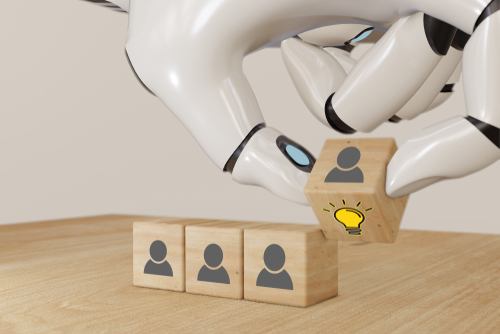How much more powerful is artificial intelligence (AI) about to become, and how important are human beings at the center of it all? It’s an interesting question, and ChatGPT has obviously forced this issue to the front of everyone’s minds. But the reality is that AI has already influenced recruiting in many ways. For me, the interesting thing to consider is just how much more powerful AI is about to become but also how important human beings will be simultaneously.
Pros and Cons of Different Use Cases
People have been using AI in recruiting platforms like LinkedIn for some time now to find relevant candidates. The problem with the type of system these platforms are using is that, while it’s reasonably effective as a tool, it’s effective in the same way that banging two rocks together to start a fire is effective. It gets the job done, but it’s super primitive.
The AI being used doesn’t understand recruiters’ context, what they’re looking for, or how to best position a role for what a candidate is looking for, so you have these super complicated systems that don’t actually save recruiters any time because they’re stripped of nuance. This means recruiters still rely heavily on searching through candidates and all the problems that entails. It’s such a laborious process that people just inevitably fall into the same habits of relying on biased factors like education or work experience at top-10 companies in a sector. (Incidentally, this was the root of the Amazon scandal a while back, when it essentially built a male detector to find more software developers.) The point is that there are many highly qualified candidates outside of those groups who get overlooked with this approach.
Machine Learning
While machine learning comes in many forms, the biggest differentiator for recruiting purposes is that AI gives recruiters the same generic candidate results without context. Alternatively, with machine learning, the software can reverse-engineer what a recruiter is looking for in a specific candidate for a specific position at a specific company based on previous judgments about which candidates are good and bad for a particular role. It can review a list of 10,000 candidates and narrow down the 50 candidates who are most likely to be precisely what the recruiter or hiring manager is looking for. This means the system can focus more on job titles, skills, or keywords in a candidate’s experience that would be difficult to identify by running a traditional search. By focusing more on the needs of a given position, machine learning can simultaneously deliver more relevant and likely less biased results than a manual search for candidates.
ChatGPT
The other obvious new development is ChatGPT (and other generative AI solutions like Bard, LLaMA, etc.), which has several different applications within recruiting. The most obvious is outreach—customizing the messaging of e-mails and drip campaigns based on the context of the candidate, the job description, and the company. It sounds obvious, but it’s amazing that you can write a prompt like “Write a three-e-mail drip sequence to a potential candidate that convinces that person to join my exciting start-up” and get a reasonable result in seconds. The more you can tailor the messaging to the role, the better your response rates will be. It’s going to save recruiters millions of collective hours if it hasn’t already.
I should note that ChatGPT has some big limitations, so it’s important to view the messaging as a suggestion that will require human review and editing for accuracy. It’s been known to “hallucinate” information that isn’t there or get basic facts wrong, so you’re always going to have to hold its hand in some way. But like I said, it can save considerable time, and the best thing is that it’s widely available for free, so even if ChatGPT isn’t built into your recruiting product, you can still use it to help generate better campaigns.
The Bottom Line
The upshot of all of this is that the advances we’ve seen over the last year with AI are genuinely stunning and transformative, but you’ll notice that the human component is still going to be holding the reins for a while yet. It makes people more productive and efficient, but the human component becomes even more important.
Jeremy Schiff is the CEO of RecruitBot.


